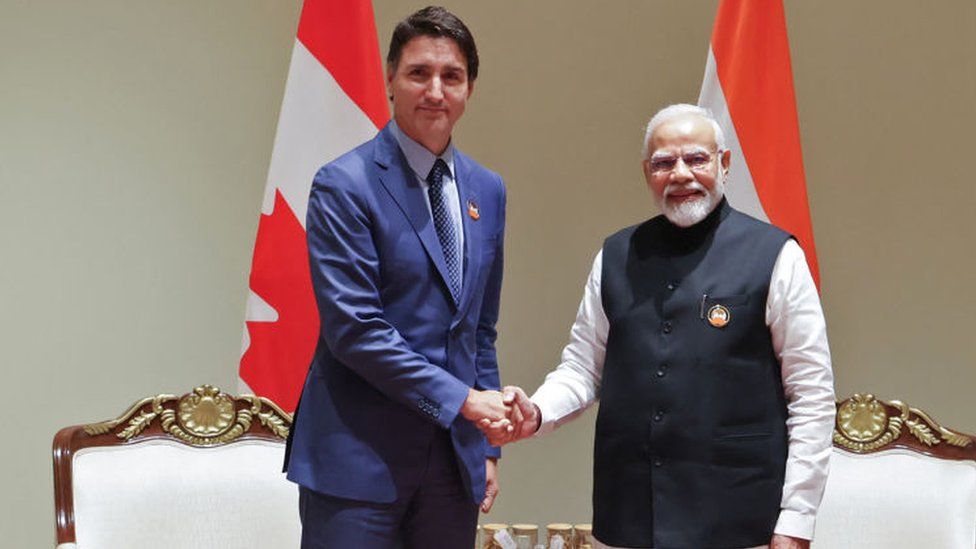Canada withdraws 41 diplomats from India
Forty-one Canadian diplomats have recently left India amid a rift over the murder of a Sikh separatist leader on Canadian soil.
India asked Canada two weeks ago to withdraw dozens of its diplomatic staff and threatened to remove their immunity if they remained.
Canadian officials called the threat a “violation of international law”.
Relations have been tense after Canada accused India of being behind the 18 June killing of Hardeep Singh Nijjar.
India has denied the allegations, calling them “absurd”.
On Thursday, Canada’s foreign minister, Melanie Joly, confirmed that many Canadian diplomats and their dependents in India have now left the country.
She said India had said that immunity for “all but 21 diplomats” will be “unilaterally removed” by 20 October.
The BBC has reached out to the High Commission of India in Canada for comment.
Ms Joly said that the remaining 21 diplomats are still in India, but the withdrawal means Canada will have to limit its services in the country due to a shortage of staff.
Specifically, the move will put a pause on in-person operations in Bangalore, Mumbai, and Chandigarh, Ms Joly said. Officials said there is no timeline on when those services will resume.
Services will still be available out of the High Commission of Canada in Delhi, and applications centres – which are third-party run – will also remain open, officials said.
However, the reduction of staff is anticipated to significantly slow down processing times for immigration applications, at least in the short term, said Canadian immigration minister Marc Miller.
It will be primarily Indian citizens who will be affected, officials said, including international students looking to study in Canada.
Indian nationals made up the largest percentage of applicants for temporary and permanent residency in Canada in 2022.
India says Canada had many more diplomats in Delhi than India has in Ottawa, and has demanded parity ever since the row between the two countries erupted,
But the Global Affairs website which lists the Indian diplomats in Ottawa suggests they had about the same number.
India saying it would remove diplomatic immunity for Canadian envoys is a “violation of international law”, Ms Joly said during a news conference in Ottawa.
She added that Canada will not reciprocate.
“If we allow the norm of diplomatic immunity to be broken, no diplomats anywhere on the planet would be safe,” Ms Joly said.
Officials said they still welcome Indian nationals who want to visit or move to Canada.

Canada-India relations have deteriorated to a historic low after Prime Minister Justin Trudeau said in September there was credible evidence of a potential link between India and Nijjar’s murder.
Mr Trudeau said this was based on Canadian intelligence, which suggested that “agents of the government of India” were behind the killing. This, Canada has said, is a violation of its sovereignty.
Nijjar was shot and killed by two masked gunmen outside the Sikh temple he led in Surrey, British Columbia. Canadian police called it a “targeted attack”, and an investigation into the murder is ongoing.
He was an outspoken advocate for the creation of a separate state of Sikhs in India called Khalistan – a movement staunchly opposed by India – and India had designated him as a terrorist in 2020.
Despite the public accusation, Mr Trudeau has repeatedly said that Canada is not looking to escalate the rift with India.
He has called on Indian officials to cooperate with the investigation into Nijjar’s death.



